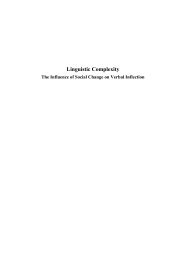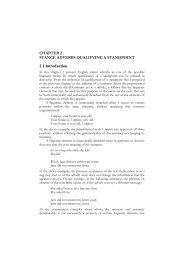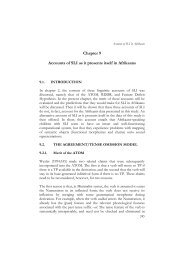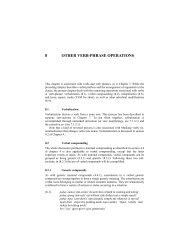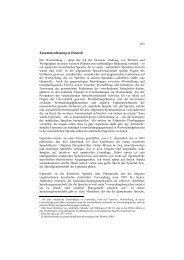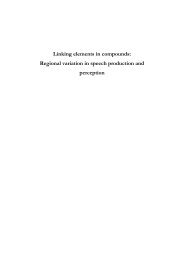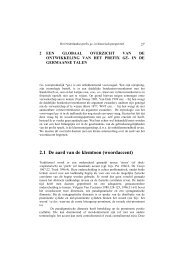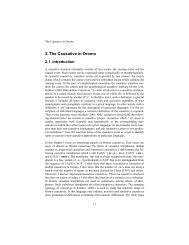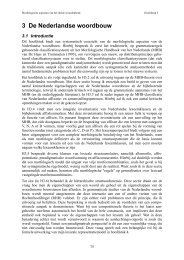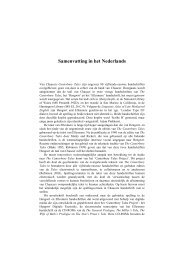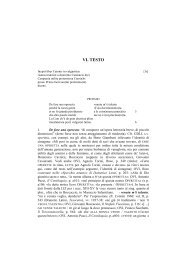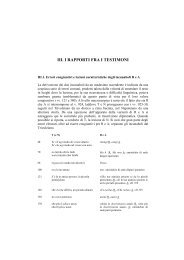Chapter 3 The Dutch Situation - LOT publications
Chapter 3 The Dutch Situation - LOT publications
Chapter 3 The Dutch Situation - LOT publications
You also want an ePaper? Increase the reach of your titles
YUMPU automatically turns print PDFs into web optimized ePapers that Google loves.
<strong>The</strong> <strong>Dutch</strong> <strong>Situation</strong><br />
relative pronoun after the neuter noun programma ‘program’ and an instance of a<br />
neuter gender pronoun for the common gender noun post ‘mail’.<br />
(7) Slordig<br />
Ik stoor me aan het groeiend aantal slordigheidsfouten in de Volkskrant.<br />
Een willekeurige greep uit de krant woensdag 5 mei:<br />
een reparatieprogramma die het mankement verhelpt<br />
dat post vooral zoek raakt omdat het in de verkeerde…<br />
‘Sloppy<br />
I’m bothered by the increasing number of sloppy mistakes in the<br />
Volkskrant. An arbitrary selection from the newspaper Wednesday 5 May:<br />
a reparation program(N) that.C cures the problem<br />
that mail(C) is getting lost because it.N [is put] in the wrong...’<br />
(De Volkskrant 10 May 2004)<br />
Another example is a letter published in the rubric Taalergernissen (‘language<br />
offences’) of the periodical Onze Taal (‘Our Language’), complaining about the use<br />
of common gender relative or demonstrative pronouns after neuter nouns. <strong>The</strong> nouns<br />
listed by the writer are lichaamsdeel ‘body part’, vriendje ‘boyfriend.DIM’,<br />
verkiezingsbord ‘election poster’ and het Turkse leger ‘the Turkish army’ (Onze<br />
Taal 1/2006: 35). Neither of the cases is predicted or explained by the rules of the<br />
ANS or the Groene Boekje.<br />
<strong>The</strong> highest degree of public awareness is enjoyed by a phenomenon referred to as<br />
“haar-ziekte” (‘haar-disease’), a particular usage of the feminine possessive (full<br />
form) haar. This usage will be discussed below in section 3.1.6. Like no other, it<br />
exemplifies the gap between spoken and written language: it is a phenomenon of<br />
written language that goes so strongly against the speakers’ intuition that it has<br />
attracted general attention.<br />
<strong>The</strong> situation is very different in spontaneous speech. Cases of self-correction or of<br />
explicit negotiation are rare. <strong>The</strong> corpus provides one amusing example:<br />
(8) A: als je zo’n intelligente kip hebt heb je<br />
if you such_a intelligent.C chicken(C) have have you<br />
eigenlijk geen hok voor nodig. ‘k bedoel dan blijft ie ook<br />
actually no cage for need I mean then stays 3.M also<br />
wel binnen de ruimtes die je ‘m geeft.<br />
AFF inside the spaces that you 3.M give<br />
‘if you have such an intelligent chicken you don’t really need a run for it.<br />
I mean then it’ll stay in the room you give it’<br />
44



